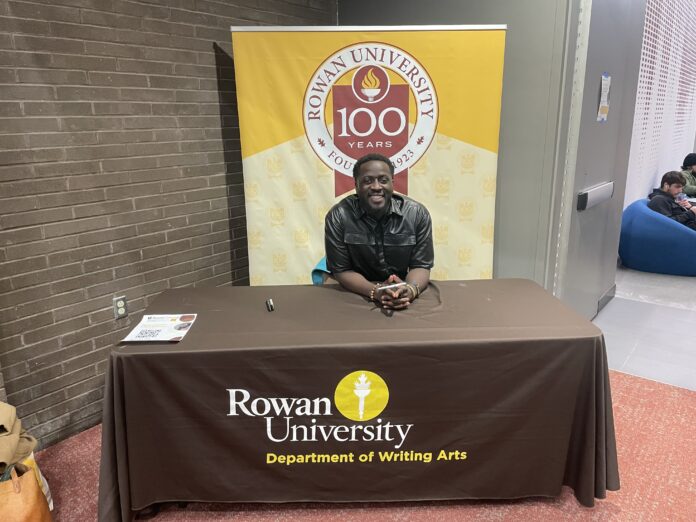
On Feb. 29, Rowan University’s Writing Arts Department welcomed New York Times best-selling author Nana Kwame Adjei-Brenyah who read excerpts from his debut novel “Chain-Gang All-Stars.” He also had the opportunity to answer questions from audience members and sign copies of the novel.
“’Chain Gang All Stars’ is about an imagined future in which convicted wards of the state can opt out of a sentence of at least 25 years and then participate in death matches. Sort of the impetus for that, or they can, if they survive three years on that system, they get freed” said Adjei-Brenyah. The novel addresses numerous issues from racism to prison systems to poverty.
Adjei-Brenyah, born in the Bronx, New York, wrote this novel with an eye to the future regarding the prison system.
“I wanted to interrogate closely the sort of idea of the prison system and the way it works as is, which is to say, I’m interested in some of the fundamental sort of ideals that say if someone does this thing wrong if they do this so-called crime,” said Adjei-Brenyah.
Throughout the novel, we are introduced to a variety of characters. Some of the characters are Hamara “Hurricane Stax” Stacker, Loretta Thurwar, Melancholia Bishop, and Sunset Harkless.
“Hurricane Stax, Stacker. I look up to her because of how much she believes in what she believes in. And so I try my best to not be cynical, to believe in love and compassion. And I think she’s someone who does that well,” Adjei-Brenyah said, revealing his favorite character.
The one word that comes to Adjei-Brenyah’s mind when presenting the novel is compassion.
“Compassion. And it’s a word I’ve used in a lot of interviews. And the reason why I say compassion is that I think it’s the answer. I think I’m presenting an intense poison that exists now, even though I’m exaggerating it. But I think the antidote is compassion. And I think the book is trying to remind us of that in some ways too,” said Adjei-Brenyah.
While Adjei-Brenyah was delighted to write this novel, he was forced to confront unfortunate and horrifying realities about the United States.
“We are a country that tolerates great injustices, whether it be racial disparities in the prisons, whether it be the particular targeting of the LGBTQ+ community in prisons, whether it be the fact that, prisons sort of individualized and criminalized issues that are systemic, like poverty. Prisons keep us from responding compassionately to diseases like addiction. Prisons keep us from responding compassionately to mental health crises,” said Adjei-Brenyah.
Adjei-Brenyah made the reading entertaining as he even had audience participation while reading excerpts from two chapters of the novel. As he was reading from the prologue: The Freeing of Melancholia Bishop, he instructed the crowd to shout “Bishop” every time he read Melancholia which made the reading more exciting and interactive.
People in the audience were entertained and would recommend reading the book.
“100%,” said Tiers Congdon, a Rowan University graduate student.
For comments/questions about this story DM us on Instagram @thewhitatrowan or email the.whit.arts@gmail.com.





